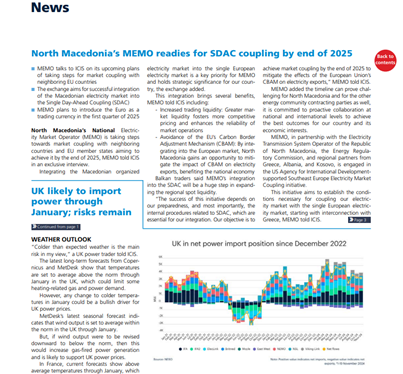
- MEMO talks to ICIS on its upcoming plans of taking steps for market coupling with neighboring EU countries
- The exchange aims for the successful integration of the Macedonian electricity market into the Single Day-Ahead Coupling (SDAC)
- MEMO plans to introduce the Euro as a trading currency in the first quarter of 2025
WARSAW (ICIS)–North Macedonia’s National Electricity Market Operator (MEMO) is taking steps towards market coupling with neighboring countries and EU member states aiming to achieve it by the end of 2025, MEMO told ICIS in an exclusive interview.
Integrating the Macedonian organized electricity market into the single European electricity market is a key priority for MEMO and holds strategic significance for our country, the exchange added.
This integration brings several benefits, MEMO told ICIS including:
- Increased trading liquidity: Greater market liquidity fosters more competitive pricing and enhances the reliability of market operations
- Avoidance of the EU’s Carbon Border Adjustment Mechanism (CBAM): By integrating into the European market, North Macedonia gains an opportunity to mitigate the impact of CBAM on electricity exports, benefiting the national economy
Balkan traders said MEMO’s integration into the SDAC will be a huge step in expanding the regional spot liquidity.
“The success of this initiative depends on our preparedness, and most importantly, the internal procedures related to SDAC, which are essential for our integration. Our objective is to achieve market coupling by the end of 2025 to mitigate the effects of the European Union’s CBAM on electricity exports,” MEMO told ICIS.
MEMO added the timeline can prove challenging for North Macedonia and for the other energy community contracting parties as well, it is committed to proactive collaboration at national and international levels to achieve the best outcomes for our country and its economic interests.
MEMO, in partnership with the Electricity Transmission System Operator of the Republic of North Macedonia, the Energy Regulatory Commission, and regional partners from Greece, Albania, and Kosovo, is engaged in the US Agency for International Development-supported Southeast Europe Electricity Market Coupling initiative.
This initiative aims to establish the conditions necessary for coupling our electricity market with the single European electricity market, starting with interconnection with Greece, MEMO told ICIS.
“Next month, the Ministerial Council of the Energy Community will meet, and we expect to gain further insights and updates on the integration process at the regional level. This meeting should offer important clarifications regarding the upcoming roadmap, helping us align our efforts with both regional and European objectives,” MEMO added.
INTRADAY PLANS
MEMO plans to launch the euro as a trading currency in the first quarter of 2025, essential change for integrating Macedonian electricity market into the single European market and facilitating an intraday market in the future.
“MEMO is actively engaged in introducing new trading segments to the organized electricity market, including the intraday market. Comprehensive analyses are underway to determine the optimal timing for launching this market segment, which will correlate with the market coupling process,” the company told ICIS.
GOs PUSH
The introduction of Guarantees of Origin (GOs), to be issued by MEMO are essential for domestic companies exporting to European markets.
Recently, MEMO became an observer member of the Association of Issuing Bodies (AIB), a leading European association committed to transparency in energy certification by standardizing GOs across Europe.
“We aim to establish and manage a register for GOs, overseeing their issuance, transfer, recognition, and cancellation, ensuring alignment with European energy standards,” MEMO told ICIS.
“We are in the process of selecting and implementing a software solution for administering GOs that will fully comply with the standards and European practices of AIB. After adopting the rules for the administration of GOs, we plan to complete this step and start issuing GOs in the first quarter of next year,” MEMO concluded.
By Luka Dimitrov
www.icis.com
